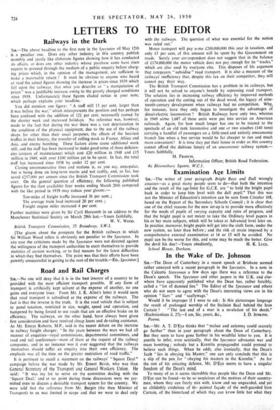Road and Rail Charges
Sia,—No one will deny that it is in the best interest of a country to be provided with the most efficient transport possible. If any form of transport is artificially kept solvent at the expense of another, no one gains and everyone loses. From Mr. J. E. Allen's letter it would seem that road transport is subsidised at the expense of the railways. The fact is that the reverse is the truth. It is the road vehicle that is subject to penal taxation, restricted in size, weight, speed and operation, and hampered by being forced to use roads that are an effective brake on its efficiency. The railways, on the other hand, have always been given first consideration and have received cheap loans and de-rating assistance. As Mr. Emrys Roberts, M.P., said in the recent debate on the increase in railway freight charges: "In the years between the wars we had all manner of enquiries—royal commissions, departmental committees, and road and rail conferences—most of them at the request of the railway companies, and in no instance was it ever suggested that the railways themselves should suffer an enquiry into their own efficiency. The emphasis was all the time on the greater restriction of road traffic."
It is pertinent to recall a statement on the railways' " Square Deal" campaign before the war made by Mr. Ernest Bevin, who was then
General Secretary of the Transport and General Workers Union. He
said: " It was my lot to serve on the committee dealing with. the ' Square Deal,' and at no point during those discussions were we per- mitted even to discuss a desirable transport system for the country. We were told that the reference from Mr. Burgin (the then Minister of Transport) to us was limited in scope and that we were to deal only with the railways. The question of what was essential for the nation was ruled out."
Motor transport will pay some £200,000,000 this year in taxation, and only 13 per cent. of this amount will be spent by the Government on roads. Surely your correspondent does not suggest that in the balance of £174,000,000 the motor vehicle doers not pay enough for its "tracks," which are also used by everyone else. This disposes of his argument that ratepayers " subsidise " road transport. It is also a measure of the railways' inefficiency that, despite this tax on their competitor, they still cannot pay their way.
The British Transport Commission has a problem in its railways, but it will not be solved to anyone's benefit by repressing road transport. The solution lies in increasing railway efficiency by improved methods of operation and the cutting out of the dead wood, the legacy of nine- teenth-century development when railways had no competition. Why, for instance, have they only begun to investigate the advantages of diesel-electric locomotives ? British Railways have only two, whereas in 1949 alone 1,687 of these units were put into service on American railroads. Again, for how much longer has one to be treated to the spectacle of an old tank locomotive and one or two coaches (140 tons) carrying a handful of passengers on a little-used and entirely uneconomic branch line when a bus service would be far cheaper to run and much more convenient? It is time they put their house in order as this country cannot afford the dubious luxury of an uneconomic railway system.— Yours faithfully.
M. FRANCIS, information Officer, British Road Federation. 4a Bloomsbury Square. W.C.I.






































 Previous page
Previous page